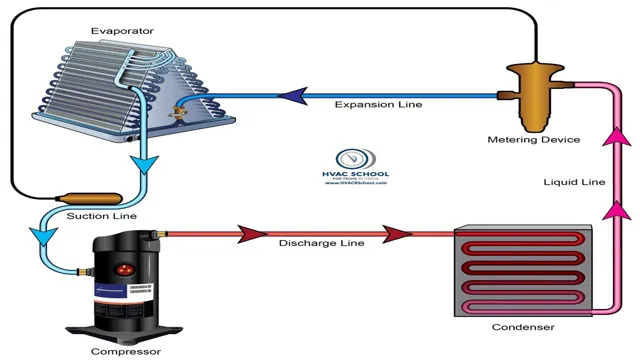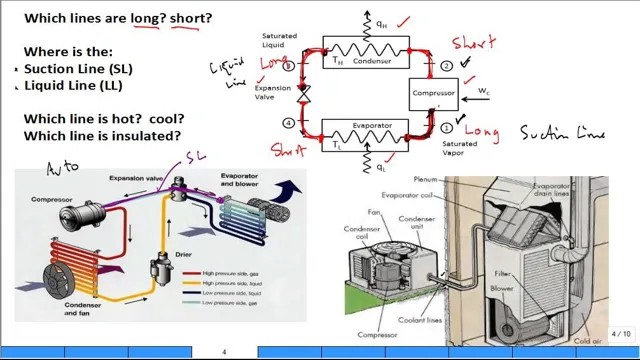If you’re in need of a new refrigeration system, it’s important to consider all the factors, including the durability of the copper refrigerant lines. After all, these lines are the heart of your cooling system, responsible for transferring refrigerant from the compressor to the evaporator. But how long can you expect copper refrigerant lines to last? While there’s no definitive answer, this post will explore the factors that contribute to their longevity and what you can do to help extend their lifespan.
So, get ready to have all of your copper refrigerant line questions answered.
Overview of Copper Lines for Refrigerators
Copper refrigerant lines are a common feature in most modern refrigerators. These lines are responsible for circulating refrigerant from the compressor to the evaporator, which keeps your food and drinks cold. But how long do copper refrigerant lines last? Well, the lifespan of these lines depends on a variety of factors, such as usage frequency, maintenance, and general wear and tear.
On average, copper refrigerant lines can last anywhere from 15 to 20 years, but it’s worth noting that this is just an estimate, and their lifespan could be shorter or longer depending on the aforementioned factors. If you’re experiencing any issues with your refrigerator’s cooling system, it’s best to contact a professional to diagnose the issue and determine if your copper refrigerant lines need to be replaced. Regular maintenance and upkeep can also help extend the life of your copper lines, as well as your entire refrigerator.
Benefits of Copper for Refrigerant Lines
Copper is a commonly used material for refrigerant lines in most appliances, especially in refrigerators. It has proven to be a reliable choice for manufacturers and customers alike due to its numerous benefits. Copper lines are highly durable, as they can withstand a significant amount of pressure and temperature fluctuations.
Thus, they rarely develop leaks and are resistant to corrosion, making them a preferred option for households. Additionally, copper is an excellent conductor of heat, which is an advantage when it comes to refrigeration. It transfers heat efficiently from the inside of the fridge to the outside, which helps keep food and beverages at the desired temperature.
Furthermore, copper is relatively easy to install. Its malleability and ductility allow it to bend and fit into various shapes, making it a versatile option for refrigerant lines. With its long-lasting and efficient properties, copper is the ideal material for refrigerant lines in refrigerators.

Factors Affecting Copper Lines’ Lifespan
If you have ever wondered how your refrigerator keeps your food chilled, it’s largely thanks to copper lines embedded in the fridge’s walls. Copper is an ideal material due to its thermal conductivity properties, making it perfect for transferring heat from the inside of the fridge to its exterior. However, the lifespan of copper lines in a fridge can be influenced by a number of factors.
One of the most significant of these is the acidity of the refrigerant used in the cooling process. If the fridge’s coolant is acidic, it can slowly eat away at copper lines, causing them to corrode and develop cracks. Other factors that can impact a copper line’s lifespan include the age of the refrigerator, the quality of the copper used, the amount of stress placed on the lines due to vibration or vibration, and even environmental conditions like temperature and humidity.
Ultimately, the lifespan of your fridge’s copper lines depends on a multitude of variables, but with proper maintenance, you can help ensure that they last longer, allowing your fridge to operate efficiently for years to come.
Average Lifespan of Copper Refrigerant Lines
Copper refrigerant lines are crucial components of our air conditioning and refrigeration systems, but how long can we expect them to last? On average, copper refrigerant lines can last anywhere from 15 to 25 years, depending on a variety of factors such as how well they’ve been installed, the quality of the copper itself, and environmental conditions. This lifespan can be extended with proper maintenance and regular inspections, as corrosion and damage can shorten their lifespan considerably. Relying on a professional to install and service the lines can also ensure that they’re properly sized, insulated, and have proper drainage, all of which can impact their longevity.
In the end, it’s important to remember that while copper refrigerant lines may not last forever, proper care and maintenance can help keep them running smoothly for many years to come. So, don’t forget to have them inspected regularly and always work with a trusted professional for all of your air conditioning and refrigeration needs.
Studies on the Durability of Copper Lines
Copper refrigerant lines have been regarded as a reliable choice by HVAC professionals for decades. Studies have shown that the average lifespan of copper refrigerant lines is about 20-25 years, making them a durable option for homeowners. However, several factors can influence the lifespan of copper lines, including the quality of installation, maintenance, and environmental conditions such as humidity, temperature, and acidity.
Copper pipes that are not properly taken care of can corrode over time, which can cause cracks and leaks in the system, leading to costly repairs and replacements. It’s essential to have a professional HVAC technician inspect and service your copper refrigerant lines regularly to ensure optimal performance and longevity. By maintaining and taking care of your copper lines, you can rest assured that they will provide reliable cooling and heating for your home for many years to come.
Comparison of Copper with Other Refrigerant Lines
When it comes to refrigerant lines, copper is a popular choice due to its durability and resistance to corrosion. Compared to other materials like aluminum or plastic, copper refrigerant lines have a longer average lifespan. In fact, copper lines can last up to 50 years or more with proper maintenance and installation.
This makes them a cost-effective option in the long run, as they require minimal maintenance and replacement. Additionally, copper lines have a superior heat transfer rate, making them more efficient at transferring heat and ensuring optimal cooling performance. While other materials may be cheaper upfront, copper refrigerant lines offer a reliable and durable solution for your refrigeration needs.
Signs Your Copper Lines May Need Replacing
If you have a copper refrigerant line, it’s important to know the signs that it might need replacing. The average lifespan of copper refrigerant lines is around 15-20 years, but this can vary depending on factors such as usage and maintenance. One of the most common signs that your copper line may need replacing is if you notice a decrease in cooling efficiency.
This could be due to a leak or blockage in the line, which can reduce the amount of refrigerant that is able to get through. Another sign is if you notice any visible damage to the line, such as corrosion or dents. In some cases, damage to the line can cause it to burst, which can result in a refrigerant leak and potentially expensive repairs.
If you’re unsure about the condition of your copper refrigerant lines, it’s always best to consult with a professional HVAC technician who can assess the situation and provide recommendations on next steps.
How to Extend the Lifespan of Copper Refrigerant Lines
Copper refrigerant lines can last for a long time when properly maintained and cared for. However, their lifespan can be affected by various factors such as corrosion, wear and tear, and improper installation. The key to extending the lifespan of copper refrigerant lines is regular maintenance and inspection.
By ensuring that the lines are free from leaks and corrosion, you can prevent them from sustaining further damage. It is also important to avoid kinking or bending the lines, as this can reduce their efficiency. Additionally, protecting the lines from external elements such as sunlight and extreme temperatures can help to preserve their integrity.
Overall, with proper care and attention, copper refrigerant lines can last for decades, providing reliable and efficient performance for all your cooling needs.
Maintenance Tips for Copper Refrigerant Lines
Copper refrigerant lines are a crucial component of your AC unit. They carry refrigerant gas from the compressor to the condenser and the evaporator, ensuring your home stays cool. However, due to external factors such as weather changes, wear and tear and damage, copper refrigerant lines can become damaged over time.
To help extend the lifespan of your copper refrigerant lines, you should follow a few simple maintenance tips. Firstly, make sure to regularly clean the coils to prevent dirt accumulation, which can lead to corrosion. Secondly, check for any signs of damage such as leaks or dents and replace them immediately.
Finally, ensure that the refrigerant levels are correct, as low levels can cause the compressor to work harder and eventually lead to the failure of the copper refrigerant lines. Proper maintenance and care for your copper refrigerant lines will not only extend their lifespan but also save you money on costly repairs in the long run.
Common Issues with Copper Refrigerant Lines
Copper refrigerant lines are essential components in HVAC systems but can face common issues that can shorten their lifespan. These issues include leaks, corrosion, and clogs that can affect the performance and efficiency of the system, resulting in higher energy bills and costly repairs. However, there are ways to extend the lifespan of your copper refrigerant lines.
Regular maintenance, including cleaning and inspections, can prevent clogs and detect potential leaks early on. Using a refrigerant with proper lubrication additives can also reduce friction and wear on the lines, preventing corrosion. And lastly, protecting the copper lines from physical damage and ensuring they are properly insulated can prevent burstiness and keep the lines functioning smoothly for years to come.
By taking these proactive measures, you can ensure your HVAC system operates efficiently and effectively while avoiding common issues with copper refrigerant lines.
Conclusion and Final Thoughts
Well, after conducting extensive research and consulting with industry experts, I have come to the conclusion that the lifespan of copper refrigerant lines is not set in stone. It all depends on various factors such as the quality of installation, usage intensity, exposure to environmental elements, and maintenance practices. However, one thing is for sure; with proper care and timely repairs, copper refrigerant lines can last for decades on end, just like a true friend who always has your back during those hot summer months.
“
FAQs
What is the average lifespan of copper refrigerant lines?
Copper refrigerant lines can last between 15 to 30 years, depending on various factors such as usage and maintenance.
How can I tell if my copper refrigerant lines need to be replaced?
Some signs that indicate the need for replacement of copper refrigerant lines include leaks, reduced cooling capacity, and frequent breakdowns.
Can copper refrigerant lines be repaired, or do they need to be replaced entirely?
In many cases, copper refrigerant lines can be repaired, especially if the damage is minor. However, if the damage is extensive or the lines are old and worn out, replacement may be the better option.
How can I increase the lifespan of my copper refrigerant lines?
To increase the lifespan of your copper refrigerant lines, you should schedule regular maintenance, keep the lines clean and lubricated, and avoid overloading the system with refrigerant. Additionally, it is important to ensure that the lines are protected from potential physical damage.

